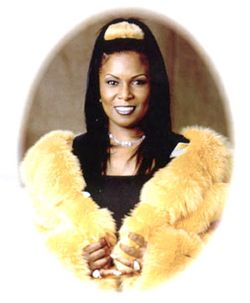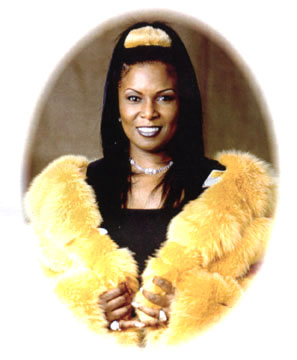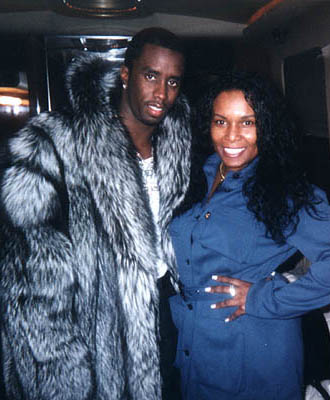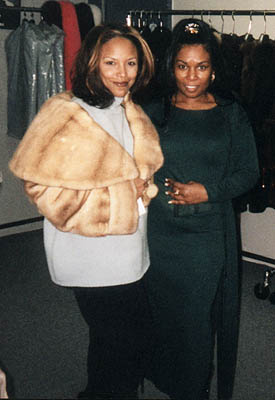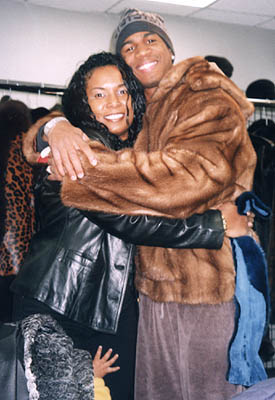As a child, Nija's greatest influences were her parents, who managed a fashionable boutique. A hunter, Nija's father first inspired her to make a fur coat from the skins of game he brought home. Nija spent summers and vacations in North Carolina with her maternal grandmother, Alice G. Manley, a farmer who raised chickens for dinner and stone marten for a stole she made to wear to church on Sundays.
Nija therefore did not grow up trapped by concrete, ignorant to the realities of nature. She once lectured me, "Don't forget, it's always been part of life in Africa and for early American slaves to use resources completely, to appreciate animals and not waste a thing. My grandmother made her own blankets. Why sleep with a down comforter when you can have a fur blanket? But really, it's not like there was a grocery store right next door, and in the days of slavery, we used what we had access to."
Nija began her career retailing furs while still in high school. She worked in a fur store in Harlem, where she recognized a need for masculine-styled men's furs. In 1990, she began working at two jobs, one for a store on Orchard Street in lower Manhattan and another on Seventh Avenue, making her own creations.
Even then she found difficulties being a minority in the fur business. As the only Black working in the Orchard Street store, she watched as Black celebrities ready to plunk down rolls of cash or platinum cards had difficulty getting service, except from her.
Along the way, Nija was blessed with surprising opportunities, meeting celebrities unexpectedly and selling them her creations, not giving them away, as is today's custom among many designers. She offered them red carpet treatment and custom-made furs -- a key to success among NBA players.
Nija also loved to cook and sing. She co-wrote the song, "Your Love is So Good," recorded by J.T. Taylor, former lead vocalist of Kool and the Gang. In 2000, she recorded background vocals for Wyclef Jean's "It Doesn't Matter."
Nija always maintained a bubbly, positive attitude. "God has been good to me," she'd say. "There is no question about it."
Events of recent months would have provided ample reason to dampen her spirit, but they didn't seem to. After so many years in the fur industry and contributing to it so greatly, she was still suffering from its deeply rooted racism and criticism about her business style.
For the past few months, she didn't have a place to bring her famous clients. Until then she shared space with a manufacturer at 307 Seventh Avenue. When they lost their lease, finding other space in the area became a challenge. Given New York's nosebleed real estate market, Seventh Avenue landlords have been doubling rents for tenants, forcing fashion houses out of the fashion district.
Nija didn't need an entire showroom space, only a corner to call her own. But furriers refused to have her, claiming her style might offend their conservative customers, and her late hours (pop stars, who perform at night, aren't usually morning people) would be inconvenient. Even with assistance and references from a prominent pelt dealer in the market, furriers didn't want "a stranger" holding keys to their showrooms.
Nija and her sister Saddiya had traveled together to Montreal on business. While there, they did some shopping. "We were in a store, and Nija suddenly said she felt dizzy," Saddiya said, fighting for composure. "So we went outside for some air, and she just fell down on the sidewalk, as if she went to sleep and never woke up. Then it was like something out of a movie; there were emergency service people working and working on her, but she was gone. It was an aneurysm."
As a child, Nija's greatest influences were her parents, who managed a fashionable boutique. A hunter, Nija's father first inspired her to make a fur coat from the skins of game he brought home. Nija spent summers and vacations in North Carolina with her maternal grandmother, Alice G. Manley, a farmer who raised chickens for dinner and stone marten for a stole she made to wear to church on Sundays.
Nija therefore did not grow up trapped by concrete, ignorant to the realities of nature. She once lectured me, "Don't forget, it's always been part of life in Africa and for early American slaves to use resources completely, to appreciate animals and not waste a thing. My grandmother made her own blankets. Why sleep with a down comforter when you can have a fur blanket? But really, it's not like there was a grocery store right next door, and in the days of slavery, we used what we had access to."
Nija began her career retailing furs while still in high school. She worked in a fur store in Harlem, where she recognized a need for masculine-styled men's furs. In 1990, she began working at two jobs, one for a store on Orchard Street in lower Manhattan and another on Seventh Avenue, making her own creations.
Even then she found difficulties being a minority in the fur business. As the only Black working in the Orchard Street store, she watched as Black celebrities ready to plunk down rolls of cash or platinum cards had difficulty getting service, except from her.
Along the way, Nija was blessed with surprising opportunities, meeting celebrities unexpectedly and selling them her creations, not giving them away, as is today's custom among many designers. She offered them red carpet treatment and custom-made furs -- a key to success among NBA players.
Nija also loved to cook and sing. She co-wrote the song, "Your Love is So Good," recorded by J.T. Taylor, former lead vocalist of Kool and the Gang. In 2000, she recorded background vocals for Wyclef Jean's "It Doesn't Matter."
Nija always maintained a bubbly, positive attitude. "God has been good to me," she'd say. "There is no question about it."
Events of recent months would have provided ample reason to dampen her spirit, but they didn't seem to. After so many years in the fur industry and contributing to it so greatly, she was still suffering from its deeply rooted racism and criticism about her business style.
For the past few months, she didn't have a place to bring her famous clients. Until then she shared space with a manufacturer at 307 Seventh Avenue. When they lost their lease, finding other space in the area became a challenge. Given New York's nosebleed real estate market, Seventh Avenue landlords have been doubling rents for tenants, forcing fashion houses out of the fashion district.
Nija didn't need an entire showroom space, only a corner to call her own. But furriers refused to have her, claiming her style might offend their conservative customers, and her late hours (pop stars, who perform at night, aren't usually morning people) would be inconvenient. Even with assistance and references from a prominent pelt dealer in the market, furriers didn't want "a stranger" holding keys to their showrooms.
Nija and her sister Saddiya had traveled together to Montreal on business. While there, they did some shopping. "We were in a store, and Nija suddenly said she felt dizzy," Saddiya said, fighting for composure. "So we went outside for some air, and she just fell down on the sidewalk, as if she went to sleep and never woke up. Then it was like something out of a movie; there were emergency service people working and working on her, but she was gone. It was an aneurysm."
Sponsored by Ancestry
Advertisement
Explore more
Sponsored by Ancestry
Advertisement
